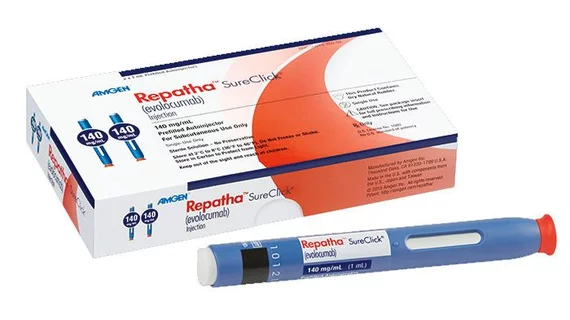Evolocumab limits adverse cardiovascular outcomes among PCI patients
Treatment with evolocumab (Repatha), a common PCSK9 inhibitor, can help patients with a history of percutaneous coronary intervention (PCI) lower their risk of a major cardiovascular event, according to new findings published in Circulation: Cardiovascular Interventions.[1]
“Patients who have undergone PCI comprise an important subgroup of patients with ASCVD,” wrote first author Remo H.M. Furtado, MD, a specialist with Albert Einstein Israelite Hospital in Brazil, and colleagues. “These patients are at risk for multiple types of coronary events, including at the site of the previous intervention as well as in the remainder of the coronary tree.”
The study’s authors examined data from the popular FOURIER trial, which included more than 27,500 patients with stabled ASCVD. Patients were treated with either evolocumab, sold under the name Repatha, or a placebo.
More than 17,000 patients from the FOURIER trial had a history of prior PCI. PCI patients tended to be younger, white, male and present with a history of myocardial infarction. They were less likely to present with a history of coronary artery bypass graft (CABG) surgery, stroke, peripheral artery disease or diabetes.
Overall, PCI patients saw their relative risk of a major adverse cardiovascular event (MACE) drop from 13.2% to 11.2% when treated with evolocumab. Among patients without a history of PCI, the team added, that relative MACE risk dropped from 8.3% to 7.4%.
In addition, evolocumab was linked with an 18% reduction in the risk of a major coronary event among PCI patients. Among patients without a history of PCI, that risk was still reduced by 12%.
The risk of an additional PCI or CABG was also consistently lower among PCI patients given evolocumab.
“We observed a directionally consistent effect of evolocumab on coronary revascularization across a variety of lesion and procedure types,” the authors wrote. “This finding is noteworthy given that patients with prior PCI are at risk for several types of adverse coronary processes, including chronic or acute lesions in untreated vessels, stent failure in previously treated lesions and graft failure in patients who have also had a prior CABG.”
The team did note that their findings are part of a subgroup analysis and “should be regarded as hypothesis-generating.” Additional research in this area, they added, could provide more context and a better picture of the benefits of evolocumab.
Related Interventional Cardiology Content:
Distal radial access consistently lowers risk of artery occlusion during PCI
Ticagrelor alone after DAPT lowers bleeding risk among heart attack patients undergoing PCI
Heart Team consultations lead to better patient outcomes, fewer unexpected hospitalizations
Reference:

